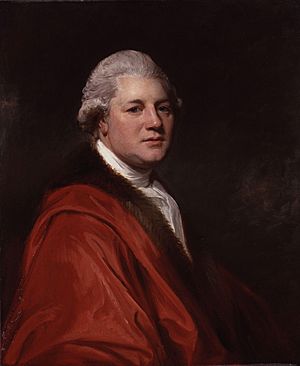James Macpherson facts for kids
Quick facts for kids
James Macpherson
|
|
|---|---|
 |
|
| Born | 27 October 1736 Ruthven, Inverness-shire, Scotland |
| Died | 17 February 1796 (aged 59) Belville, Inverness-shire, Scotland |
| Occupation | Poet, translator |
| Alma mater | Marischal College, Aberdeen University of Edinburgh |
| Literary movement | Romanticism |
James Macpherson (born October 27, 1736 – died February 17, 1796) was a Scottish writer and poet. He is famous for a series of epic poems called the "Ossian cycle." Macpherson claimed he found these old poems and translated them from the Gaelic language.
Contents
Early Life and Education
James Macpherson was born in a place called Ruthven in Inverness-shire, Scotland. This area mostly spoke Gaelic. When he was nine, a big event called the Jacobite uprising of 1745 happened. His uncle, Ewen Macpherson, joined the Jacobite army. After the fighting, his uncle had to hide for many years.
Macpherson went to King's College, Aberdeen and later Marischal College (which are now part of the University of Aberdeen). He also studied at the University of Edinburgh. During his time as a student, he wrote many poems. One of his published works was The Highlander (1758), a long poem he later tried to stop from being sold.
Collecting Old Gaelic Poems
After college, Macpherson became a teacher and then a private tutor. He met a writer named John Home and shared some Gaelic verses he knew by heart. He also showed Home old Gaelic poetry manuscripts he said he found in the Scottish Highlands and Western Isles. One of these was called The Death of Oscar.
In 1760, Macpherson traveled to North Uist and met John MacCodrum, a famous poet (called a Bard) for a Scottish clan. Macpherson tried to ask MacCodrum if he knew anything about old heroes called the Fianna. But because Macpherson's Gaelic wasn't perfect, he accidentally asked, "Do the Fianna owe you anything?" MacCodrum cleverly replied, "No, and if they did, it would be useless to ask for it now."
Encouraged by others, Macpherson published 15 short poems in 1760. He said these were translations from Gaelic, even though his Gaelic wasn't perfect. This collection was called Fragments of Ancient Poetry collected in the Highlands of Scotland. These poems became very popular and made people wonder if there was a lost Gaelic epic story.
A supporter named Hugh Blair helped Macpherson get money to search for more Gaelic writings. In 1760, Macpherson traveled to different parts of Scotland, including the Isle of Skye and the Isle of Mull. He claimed to find more old manuscripts, which he then translated.
The Ossian Poems
In 1761, Macpherson announced he had found an epic poem called Fingal, supposedly written by an ancient bard named Ossian. He published it in December. The full title was Fingal, an Ancient Epic Poem in Six Books, together with Several Other Poems composed by Ossian, the Son of Fingal, translated from the Gaelic Language. This story was based on the Irish hero Fionn mac Cumhaill (also known as Finn McCool). Ossian was based on Fionn's son, Oisín.
Another long poem, Temora, came out in 1763. A full collection of his Ossian works was published in 1765.
However, many people, especially Irish historians like Charles O'Conor, immediately questioned if these poems were truly ancient. They pointed out mistakes in the dates and Gaelic names. Later, Samuel Johnson also said that Macpherson likely found small pieces of old stories and then wrote his own new stories around them. The debate about whether the Ossian poems were real or fake continued for many years. Macpherson's own Gaelic "originals" were published after he died in 1807, but many believed they were actually translated back into Gaelic from his English versions.
Later Career and Politics
In 1764, Macpherson became a secretary for the governor of Pensacola, Florida. He returned to Great Britain two years later and kept his salary as a pension.
Macpherson then wrote several history books. He also worked for the government, defending the policies of Lord North. He became a London agent for the Nawab of Arcot, which was a very profitable job.
In 1780, Macpherson became a Member of Parliament for Camelford. He stayed in this position until he died. While not much is recorded about his time in Parliament, it is thought he received secret payments from the government. This suggests he might have been working for the government in ways that were not public.
Death and Legacy
In his later years, Macpherson bought an estate in his home area of Inverness-shire, which he named Belville. He died there at the age of 59. His body was brought from Scotland and buried in Westminster Abbey in London. Some say he bought the right to be buried there.
After Macpherson's death, a historian named Malcolm Laing said that the Ossian poems were completely new and that Macpherson didn't have real ancient sources.
Despite the controversy, many people believe Macpherson's Ossian poems were very important for the Romantic movement in European literature. They were quickly translated into many languages. Famous writers like Goethe admired them greatly. Goethe even included parts of Macpherson's work in his novel The Sorrows of Young Werther. It is said that Napoleon loved the Italian translation of the poems.
Macpherson's work also indirectly led to the naming of Fingal's Cave on the island of Staffa. The cave's original Gaelic name meant "the melodious cave," but it was renamed by Sir Joseph Banks in 1772 because Macpherson's Ossian poems were so popular.
See also
 In Spanish: James Macpherson para niños
In Spanish: James Macpherson para niños
 | Emma Amos |
 | Edward Mitchell Bannister |
 | Larry D. Alexander |
 | Ernie Barnes |

